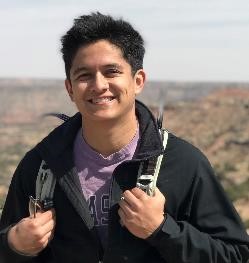Graduate Colloquium Series: Aaron Lira (GEOG) 3/26/19
“Common Sense in a Nonsensical Place: A Sensory Ecology Approach to Central Oregon’s Irrigation Governance” Tuesday, March 26, 2019, 4-5 p.m. Location: 311 Glasscock Building Aaron Lira M.A. candidate| Department of Geography, 2018-2019 Glasscock Graduate Research Fellow Abstract: How is it that our visual and auditory experiences with water can be fundamentally political? In central […]

“Common Sense in a Nonsensical Place: A Sensory Ecology Approach to Central Oregon’s Irrigation Governance”
Tuesday, March 26, 2019, 4-5 p.m.
Location: 311 Glasscock Building
Aaron Lira
M.A. candidate| Department of Geography, 2018-2019 Glasscock Graduate Research Fellow
Abstract:
How is it that our visual and auditory experiences with water can be fundamentally political? In central Oregon, we argue there are fundamental shifts in farmers’ sensory experiences with their lands that are politically crafted, creating a divergence of opinion on what to do with limited water resources. Farmers’ visual and audio experience with irrigation water dictate how they decide what is best for their irrigated lands. Because of new conservation policies and extensive monitoring by irrigation districts, we argue that physical (i.e., back pains and body aches) and mental (i.e., anxiety, stress, and doubt) sensations elicited from irrigated lands are inherently political and primarily experienced through the senses. We expect sensory experiences with particularly dry lands (like the American West) to change, and with it, the intuition and decision-making of farmers will too. Common-sense solutions surrounding limited water resources in central Oregon diverge between farmers’ and their respective irrigation districts. We argue that farmers’ unique sensory experience with water is the root for divergence and must be reconciled to ease tensions and promote equitable irrigation practice.
The Graduate Colloquium offers graduate students an opportunity to discuss a work-in-progress with faculty and graduate students from different disciplines. By long-standing practice, colloquium presenters provide a draft of their current research, which is made available to members of the Glasscock Center listserv. Each colloquium begins with the presenter’s short (10-15 minute) exposition of the project, after which the floor is open for comments and queries. The format is by design informal, conversational, and interdisciplinary.
The Glasscock Center extends a warm invitation to faculty and students to join in a discussion of Aaron’s work-in-progress. The paper is available to members of the Center’s listserv, or by contacting the Glasscock Center by phone at (979) 845-8328 or by e-mail at glasscock@tamu.edu.
Join the Center’s listserv to receive regular notices of colloquium events.
